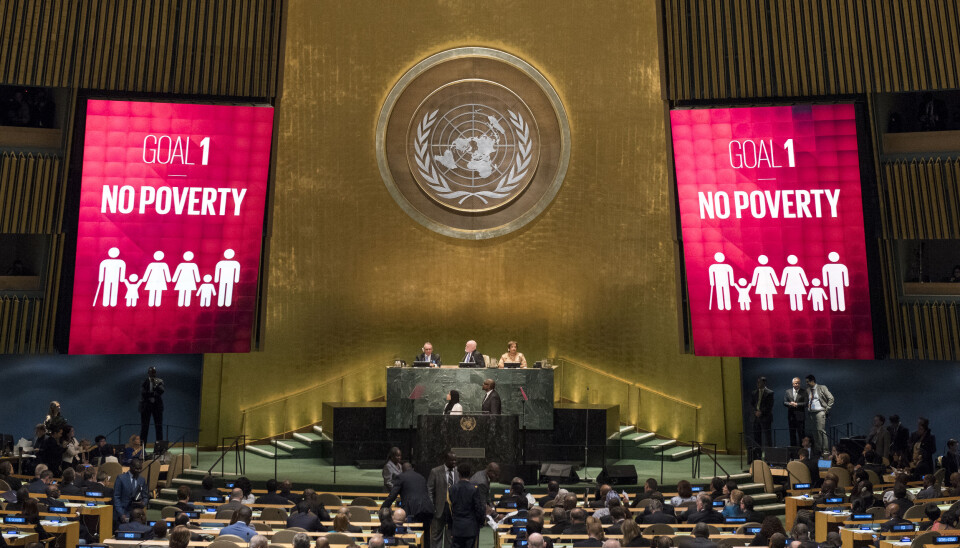
Is private finance a panacea for sustainable development?
The EU has pushed for a strong role of the private sector to finance the sustainable development goals. However, an increased role of the private sector might be at odds with the EUs fundamental rights commitments, argues Sunniva Hustad.
During the negotiations of the United Nations Sustainable Development Goals (SDGs) in 2015, the EU pushed for the inclusion of a strong role of the private sector. Early in the negotiations, the UN estimated that at the current levels of investment in SDG-relevant sectors, developing countries faced a gap of around $2.5 trillions each year. In addition to development aid and domestic resources such as taxation, the EU pointed to the private sector as the solution to meet the funding gap of the SDGs.
However, private financing of the SDGs could mean less ability to ensure that human rights obligations are upheld, which in turn conflicts with the EU’s goal of promoting and protecting fundamental values such as human rights, good governance and the rule of law.
Lack of binding regulations
The EU often pushed for Private-Public Partnerships (PPPS) and other blending mechanisms in the SDG negotiations. Blending involves the provision of public grants with the aim of leveraging equity from private financiers.
PPPs are long-term contractual arrangements where the private sector provides infrastructure and services that have conventionally been delivered by the public sector and where the private sector shares the risk of the production. Private-public partnerships could be used to fund hospitals, schools, roads or water supply and distribution.
Meanwhile, there are less regulations to secure that human rights obligations are upheld in the private sector than in the public sector.
Although some guidelines exist, such as the UN’s guiding principles on business and human rights, private companies are not legally bound by these regulations. It therefore remains unclear to what extent private companies are willing to follow such guidelines and who will act as the 'watchdog' of their policies. Moreover, private companies operate with a long chain of business relationships, hence it is not a given that companies ensure respect for human rights throughout their activities.
The whole raison d’être for the private sector is profit-making and seeking commercial returns. Private finance is by nature short-term oriented and biased towards predictable outcomes. The 2030 Agenda, on the other hand, has abstract aspirations and a long-term perspective that does not necessarily correspond well with the aims of the private sector. Even though Private-Public Partnerships are a method of blending resources from the private and the public sector, revenue will still be the main objective for the private sector part of the partnership.
This does not mean that private finance initiatives cannot have a strong social profile and contribute significantly to both job creation and public goals. However, when tension between these interests arise, there are no guarantees that the social welfare profile of a business will be pursued.
Lack of ownership
Further, Private-Public Partnerships and other blending mechanisms run the risk of reducing democratic accountability. Critics hold that these types of partnerships could undermine democracy by ‘systematically reducing responsibility, capability and power of the state’.
The concern for reduced democratic accountability when a move from state to private funding occurs, also raises the question of ownership.
Ownership has been an important requirement from development countries in the last 20 years of international debate on aid effectiveness. It has been crucial that donors have contributed to funding areas that the beneficiary states themselves have pointed out as important areas for development.
With the use of Private-Public Partnerships, however, it becomes less clear who has the responsibility to ensure that investments are made in line with developing countries own strategies for poverty reduction.
PPPs cost-ineffective for the public sector
The trend in Europe has been a drastic decrease in the use of PPPs in the latest years. The extent to which PPPs yield results has been questioned. In 2018, the European Court of Auditors reviewed EU co-financed PPPs in the road transport and communication technology sector. The Court found that nearly all the audited PPP-projects in Europe were cost-ineffective for the public sector and that the risks in these project are almost always greater for the public sector.
The auditors conclude that 'value for money and transparency were widely undermined in particular by unclear policy and strategy, inadequate analysis, off-balance-sheet recording of PPPs and unbalanced risk-sharing arrangements'. On the basis of these findings, the European Court of Auditors recommended that PPPs should not be promoted until the issues identified were addressed.
The risks in these project are almost always greater for the public sector.
Similar concerns were raised in the negotiations of financing the SDGs. During the negotiations, 142 Civil Society Organisations stressed that Public-Private partnerships and blending 'should be approached with caution, and should only be considered if other less expensive and risky financing solutions are not available'. The CSOs pointed to the fact that PPPs have some major problems in terms of capabilities and fitness for financing the SDGs.
Despite calls for caution, the EU advocated for increased use of PPPs and blended finance in the SDG negotiations. In other words, the EU promoted a model for financing development abroad that is disputed at home.







